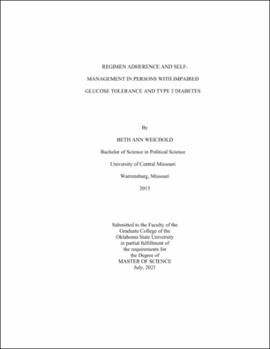| dc.contributor.advisor | DeFreitas, Jason M. | |
| dc.contributor.author | Weichold, Beth Ann | |
| dc.date.accessioned | 2022-01-21T19:34:04Z | |
| dc.date.available | 2022-01-21T19:34:04Z | |
| dc.date.issued | 2021-07 | |
| dc.identifier.uri | https://hdl.handle.net/11244/333847 | |
| dc.description.abstract | With the rising trend of obesity within the United States, the prevalence of Type 2 Diabetes (T2D) is increasing as well. The best way to stop the growing numbers of T2D is to prevent it completely. However, for those who already have T2D or Impaired Glucose Tolerance (IGT) healthy management of the disease is crucial for lowering life threatening complications and lowering mortality. There is strong evidence supported by decades of research that a lifestyle intervention (increased physical activity and healthy eating habits) is the best way to prevent T2D and to manage the disease. This type of management structure leaves out the humanity of the disease and doesn't account for the psychosocial factors at play. Depression, social support, self-care, coping mechanisms, and education on nutrition are a few of the psychosocial factors that are heavily evaluated in this study. The purpose of the present study is to calculate the magnitude of effect of a lifestyle intervention with a social support group on self-management and regimen adherence, HbA1c, body weight, and body fat percentage. This study included a 12-week lifestyle intervention with the intervention group partaking in a weekly support group. All participants were given weekly educational materials covering a biopsychosocial spectrum. In addition to the biomarkers mentioned, 6 survey instruments were used to measure self-management and regimen adherence from baseline to end of study. Following the 12-weeks, the mean increase in minutes walked weekly was 197.5 min. Analysis on the survey data showed the intervention group lowered their diabetes related distress, increased self-care habits, and decreased utilization of food as a coping mechanism. The control group data showed a higher level of diabetes related distress and a lower level of self-control from baseline to end of study. Both groups showed a decrease in self-efficacy and self-control from baseline to end of study. These findings are meaningful and add to the small amount of research already done on biopsychosocial lifestyle interventions for persons with T2D and IGT. Larger scale studies will need to be done in the future to increase the validity of statistical findings. | |
| dc.format | application/pdf | |
| dc.language | en_US | |
| dc.rights | Copyright is held by the author who has granted the Oklahoma State University Library the non-exclusive right to share this material in its institutional repository. Contact Digital Library Services at lib-dls@okstate.edu or 405-744-9161 for the permission policy on the use, reproduction or distribution of this material. | |
| dc.title | Regimen adherence and self-management in persons with impaired glucose tolerance and Type 2 Diabetes | |
| dc.contributor.committeeMember | Miller, Bridget M. | |
| dc.contributor.committeeMember | Dawes, Jay | |
| dc.contributor.committeeMember | Hawkins, Misty | |
| osu.filename | Weichold_okstate_0664M_17318.pdf | |
| osu.accesstype | Open Access | |
| dc.type.genre | Thesis | |
| dc.type.material | Text | |
| dc.subject.keywords | biopsychosocial | |
| dc.subject.keywords | lifestyle intervention | |
| dc.subject.keywords | pre-diabetes | |
| dc.subject.keywords | support group | |
| dc.subject.keywords | type 2 diabetes | |
| thesis.degree.discipline | Health and Human Performance | |
| thesis.degree.grantor | Oklahoma State University | |
